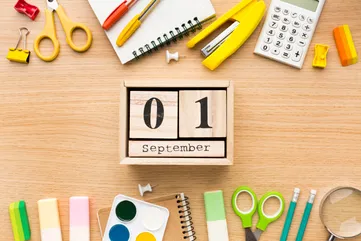Disorganization
Disorganization is the inability to create or maintain systems for managing belongings, information, time, and tasks, resulting in lost items, missed deadlines, and constant chaos.
Why organization requires explicit teaching
Executive function researchers identify organization as a core skill that some brains develop naturally while others need explicit instruction. Organization requires working memory, planning, categorization, and sustained attention—all challenging for developing adolescent brains.
Studies show that students with poor organization skills have lower GPAs independent of intelligence or effort. Disorganization creates cascading problems: lost assignments lower grades, which increases stress, which further impairs organization. Breaking this cycle requires external support while internal skills develop.
Best et al. (2011) found that executive function skills, including organization, predict academic achievement better than IQ. Langberg et al. (2013) demonstrated that organizational skills interventions significantly improve academic performance in adolescents with ADHD.
You're not alone
If you've organized your teen's room only to find it destroyed within days, or discovered completed homework crumpled in backpacks weeks late, you understand the frustration. Many parents become their teen's external organization system, creating dependence. Others give up, letting chaos reign. Neither approach builds skills. Families successfully addressing disorganization focus on sustainable systems rather than perfect order.
What it looks like day to day
Student
Your teen spends 20 minutes searching for homework they swear they completed, finding it eventually under their bed, now too wrinkled to submit.
Parent
You receive school emails about missing assignments while your teen insists they turned everything in, with no system to verify either claim.
Tiny steps to try
Build organization gradually through simple, sustainable systems.
- 1
Launch pad creation
Designate one spot for essential items. Everything for tomorrow goes there tonight. Start with non-negotiable consistency here.
- 2
Weekly backpack dumps
Schedule weekly emptying and reorganization. Make it routine with music or rewards.
- 3
Folder simplicity
One folder for "to do" and one for "done." Complexity breeds abandonment. Build from simple success.
- 4
Digital photographs
Can't organize papers? Photograph everything. Searchable chaos beats lost work.
- 5
Timer organizing
Set 10-minute timers for organizing bursts. Short sessions prevent overwhelm and build habits gradually.
Why disorganization plagues teens
Teen disorganization often stems from underdeveloped executive function rather than laziness, combining with increased academic demands to create perfect storms of chaos.
Common disorganization manifestations:
• Backpacks filled with crumpled papers from months ago
• Lost assignments completed but never turned in
• Bedroom floors invisible under belongings
• Missing sports equipment before every practice
• No system for tracking assignments
• Important items constantly misplaced
Disorganization creates stress, damages grades, and triggers family conflict.
References
Best, J. R., Miller, P. H., & Naglieri, J. A. (2011). Relations between executive function and academic achievement from ages 5 to 17 in a large, representative national sample. Learning and Individual Differences, 21(4), 327-336.
Langberg, J. M., Epstein, J. N., Becker, S. P., Girio-Herrera, E., & Vaughn, A. J. (2013). Evaluation of the homework, organization, and planning skills (HOPS) intervention for middle school students with ADHD as implemented by school mental health providers. School Psychology Review, 41(3), 342-364.
Ready to help your teen thrive?
Get personalized 1-on-1 coaching to build better habits and boost grades. Join 10,000+ families who trust Coachbit.
Frequently Asked Questions
Should we organize for our teen or make them do it alone?
Neither extreme works. Organize WITH your teen initially, gradually transferring responsibility. Model thinking processes: "Homework goes here because..." Pure rescue prevents learning; pure independence without skills ensures failure. Think scaffolding: maximum support initially, fading as competence grows.
Why can my teen organize video game inventories but not school work?
Games provide immediate feedback, clear categories, and intrinsic motivation—everything school organization lacks. Game organization also happens within a structured system, while school requires creating systems from scratch. Use game organization as proof of capability, then bridge those skills to academics using similar principles: clear categories, regular "inventory management," and rewards.
Related Terms
ADHD (Attention-Deficit/Hyperactivity Disorder)
ADHD is a neurodevelopmental condition where the brain's executive function system works differently, affecting focus, impulse control, and activity levels in about 5-10% of children.
Executive Function
Executive function is your brain's management system that helps teens plan, focus, remember instructions, and juggle multiple tasks successfully.
Organization
Organization is the ability to create and maintain systems for managing materials, information, and time in ways that support efficiency and goal achievement.
Planning
Planning is the ability to create structured approaches for achieving goals by breaking them into steps, estimating time, and sequencing actions effectively.
Time Management
Time management is the ability to plan, prioritize, and use time effectively to accomplish tasks and meet deadlines without constant crisis.
Related Articles

3 Ways an Executive Functioning Coach Can Help Your Child
Discover why executive functioning skills are crucial for your child's success. Learn how an executive functioning coach can make a difference
Read article
Finding Order in the Chaos – Setting up Calendars for Kids
Creating a calendar and daily schedule for kids can be beneficial to manage school, homework, extracurriculars and hobbies. Color-coding and time-blocking are helpful tools for kids with ADHD.
Read article
The 6 Best Study Skills for ADHD Teens
Learn the 6 best study skills for ADHD teens to boost their academic success. Prioritization, note-taking, dedicated study space, brain breaks, and multi-sensory learning. Find out how an ADHD coach can help!
Read article
